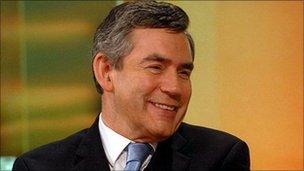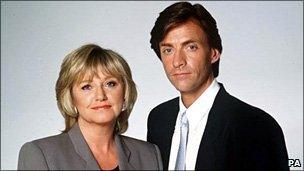The 'Project Volvo' bid to rebrand Gordon Brown
- Published

Mr Brown tried to shake off his dour image
Perhaps that's what the grin was all about.
That sudden jolt of electricity that would shoot through Gordon Brown's features whenever a camera was pointing at him.
It was, comedians sniggered, as if he was being operated by remote control.
And in a way he was.
Project Volvo - the 2006 plan to rebrand Mr Brown as a prime minister-in waiting - has been laid bare by the Daily Telegraph, external in all its wince-inducing detail.
Secret memos also obtained by the paper between Mr Brown and Tony Blair - and key aides such as Ed Balls - tell the familiar tale of frustrated ambition and bitter rivalry that led up to Mr Brown's eventual coronation.
But Project Volvo gives us an insight into the thought processes that actually shaped Mr Brown's time in Number 10 - and perhaps contains lessons for other party leaders tempted to go down a similar route.
The document does not pull any punches.

Richard and Judy were known as the king and queen of daytime TV
The then chancellor is seen by voters as "humourless, dour, moody, aggressive, unapproachable", it says. He needs to come across as more likeable.
"Use Richard and Judy mode at all times" he is advised, as if it was an item on a drop-down menu or, given Team Brown's fondness for motoring metaphors, a setting in a new sports car.
But Mr Brown was no sports car, according to his advisers.
The plan to get him into Number 10 was codenamed Project Volvo because that and "British Rover" were, apparently, the forms of transport voters most associated with him.
'Big cat'
David Cameron was "Sports car, BMW".
The new Tory leader (as he then was) was also a "horse, big cat" in the eyes of swing voters, while Mr Brown was a "bear, buffalo, dog".
Mr Cameron was "spritzer alco-pop" while Mr Brown was a "pint of beer, whiskey" (the Irish spelling of whisky in the Project Volvo document was presumably unintentional).
This is all standard polling practice. It is meant to give an insight into the gut reactions of floating voters to people they may only be dimly aware of from the television news.
What impact such insights have on the subject of them can only be guessed at (Note to self: Be more like a horse.)
'Ordinary' childhood
But the underlying philosophy is a sound one. People who cannot make up their minds which way to vote at elections often opt for the candidate they can most relate to.
And Mr Brown was seen by many people as remote and ill-at-ease.
The strategy Team Brown devised for improving their man's image was to get him to tell his personal story.
They believed the more voters got to know him, the more they would like him.
People already liked the fact that he was a family man, seemed solid, intelligent and trustworthy, and had been a "gifted" child, the polling suggested.
But they knew little about what he was really about. Some even thought he had gone to a private school, one aide reveals with a note of horror.
'Normal' spokespeople
This would account for Mr Brown's first Labour conference speech as leader, in 2007, when he spoke at length about his "ordinary" down-to-earth childhood and the eyesight-saving operation he had on the NHS as a teenager.
Or his interview with Piers Morgan on the eve of the 2010 election.
Coming across as ordinary is a running theme in these leaked documents. One note speaks of the need for more Labour spokespeople to be "normal".
Mr Brown - like so many political leaders before and since - wanted voters to believe he was just like one of us when everything in his background, from the way he was fast-tracked through school to his eventual dominance of the Labour Party and the British economy, suggested he was anything but.
His own briefing notes to aides such as Ed Balls reveal a serious, driven man, obsessed with long-term policy planning and attempting to second guess global trends.
Image is just another item on a long list of more pressing priorities.
How much time he spent agonising over it, we will never know.
But it is hard to escape the conclusion that by trying to follow the advice of his pollsters and PR people, who sometimes seemed to believe that a new personality could simply be bolted on, he only succeeded in making matters worse.
- Published10 June 2011
- Published10 June 2011
- Published1 September 2010